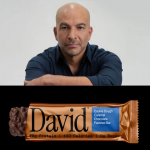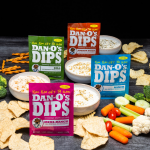News Roundup: Bedrock Analytics Unveils ChatGPT Integration; SOUND Bar Brings Military Snacks To Everyday Consumers

Bedrock Analytics Unveils ChatGPT Integration
Data analytics and AI platform Bedrock Analytics announced an upgrade to its platform that will leverage generative AI to automate insights in an effort to help CPG brands better compete in an omnichannel retail environment.
The new technology was developed using Open AI’s ChatGPT, an open-source AI model, which Bedrock has enhanced specifically for use in the CPG channel. The latest upgrade delivers “instantaneous and relevant” insights to help CPG brands make data-driven decisions in real-time, the platform claims.
“The CPG Industry is seeking productivity and competitive advantages as the market cools,” said Bedrock founder and CEO Will Salcido in a press release. “Not only do they have to harmonize disparate data sources into a single source of truth to get a view of their performance, but they also need to find the time to extract the insights to tell the stories that retail buyers will find persuasive.”
Additionally, the Bedrock platform now possesses the ability to run multi-visualizations in a singular view.
Historically, the visualization capability has only been focused on a single chart, table or analysis page which resulted in “users taking their exported slides and manually combining them on their own. Now, users will be able to select up to four visualizations to be shown in the same view.
“Artificial intelligence has become the subject of dinner conversations across the world thanks to the proliferation of AI,” said Salcido in the release. “As one of the first beta users of OpenAI since 2020, we had a multi-year headstart to get it right for the CPG industry.”
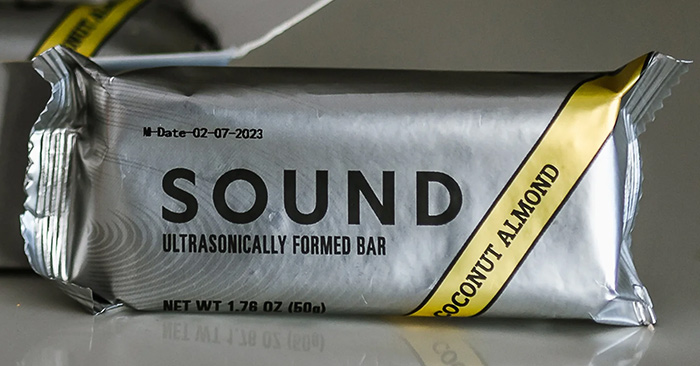
SOUND Bar Brings Military Snacks To Everyday Consumers
Ultrasonically-formed bar company SOUND Foods is bringing its U.S. military snack ration to consumers with the launch of its DTC website.
This is the second attempt at a CPG product using this proprietary technology. Originally, it launched in March 2021 direct-to-consumer with four flavors (Vanilla Lime, Mocha, Chocolate Raspberry and Coconut Surprise). The original iteration only lasted about six months before the company decided to discontinue the product and reformulate it to focus on getting military approval for servicemen and women’s MREs (Meals, Ready to Eat).
Co-founders Don Dillon and David Cho decided that as the company goes through the approval process this year, the brand would relaunch the product in its new form and flavor to test its market appeal.
Currently, the brand is offering just one flavor, Coconut Almond, for $24 per 12-bar case but is expecting to roll out five additional flavors including a savory variety that “highlights what the technology is able to do with different ingredients,” Cho told NOSH this week. The brand’s second flavor is expected to launch in the next two-to-four weeks.
The bars are made by using ultrasonic sound waves to gently vibrate quality ingredients together into a bar shape. Not only does this make a lighter weight perfect for combat fighter field rations but also makes a calorically dense snack that provides a “clean burn” of energy throughout a sustained period of time.
“Once you’ve tried it, it’s pretty obvious that it is a totally different sort of taste, texture, experience from a bar made in a different way,” Cho said. “This bar is ideal for, or designed for, would be great for somebody who’s on the clock in service of others – in the sense that [they’re ] not in control of their own eating schedule.”
This “need state,” as Cho calls it, relates to the nutritionals. Not only do the bars’ texture, weight and flavor change due to the ultrasonic formulation process but every 50g package is packed with 300 calories, about 15% of the FDA’s general guidance for daily caloric intake. Bucking the consumer trend towards high-protein, low-sugar snacks SOUND has 24g of fat and 12g of sugar, but Cho insists that the taste and the story of the snack will make it successful among consumers.
“It’s experiential,” he said. “What the U.S. warfighter needs is – hopefully – what the American consumer has been waiting for.”
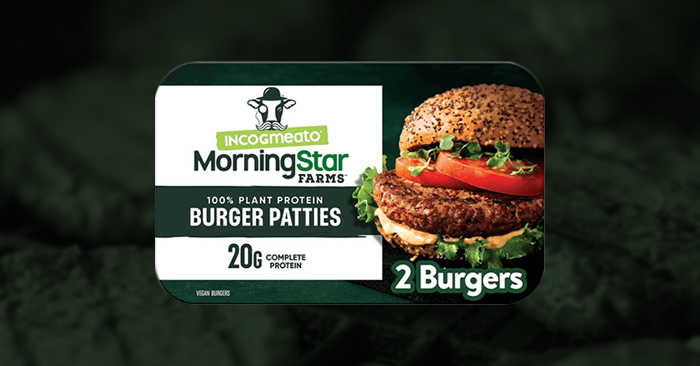
Kellogg Drops Incogmeato Burger from MorningStar Farms Portfolio
Kellogg has dropped the Incogmeato burger from its plant-based MorningStar Farms portfolio, the company said in an email to NOSH.com. MorningStar Farms will continue to sell its other Incogmeato products, including Chik’n Tenders, Sausage and Pancake on a Stick and Chick’n and Eggo Liege Style Waffle Sandwich.
“We are always looking for ways to innovate our product offerings at MorningStar Farms,” the email read. “While we discontinued the Incogmeato Burger […] we continue to add products to our lineup every year, providing new ways for people to enjoy easy, delicious, veggie-filled meals at every occasion.”
The decision comes roughly two months after Kellogg announced it had scrapped its plans to divest its plant-based division, largely due to recently challenges in the category such as sales declines facing companies like Beyond Meat and Impossible Foods.
“MorningStar Farms still has some of the highest household penetration, highest name recognition, fantastic foods, [it is] strong in the freezer space where this consumer is migrating back to, and [it is] profitable, unlike many of the peers,” said Kellogg Co. CEO Steven Cahillane during a February earnings call with investors. “So as we step back and look at it, we are the best parent for Morningstar Farms.
Last month, the company unveiled the name of its new snack arm, Kellanova, which will house the MorningStar Farms brand in addition to Pringles, Cheez-It, Gardenburger, Nutri-Grain and RX Bar. The new divisions are slated to take effect once Kellogg completes the separation of its business, which is expected by the end of 2023.
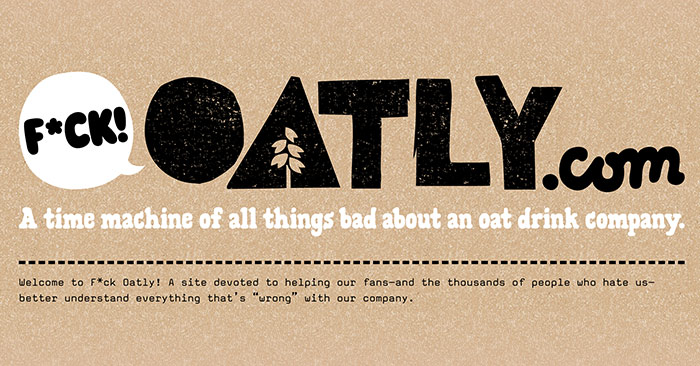
Oatly Creates Website Dedicated to Its Haters
As a testament to the saying “haters are my motivators,” oatmilk giant Oatly unveiled a new, standalone website showcasing all the criticisms and boycotts of its products (in chronological order, no less).
Named “F*ck Oatly,” the site is “devoted to helping [its] fans – and the thousands of people who hate [it] – better understand what’s wrong with [its] company,” the brand claims. From Glebe-Gate – the outrage stemming from Oatly’s lawsuit against Glebe Farm, makers of Pure Oatly – to the controversy caused when private equity firm Blackstone Group invested in the company, the site provides a look back at when thousands of people from across the world came together to boycott the plant-based milk –and addresses criticisms head-on.
And for those who wish to express their hatred for the F*ck Oatly site, the company has also created a F*ck F*ck Oatly site where consumers can press a button to confirm their dislike. To date, more than 20,000 consumers have expressed their dislike.
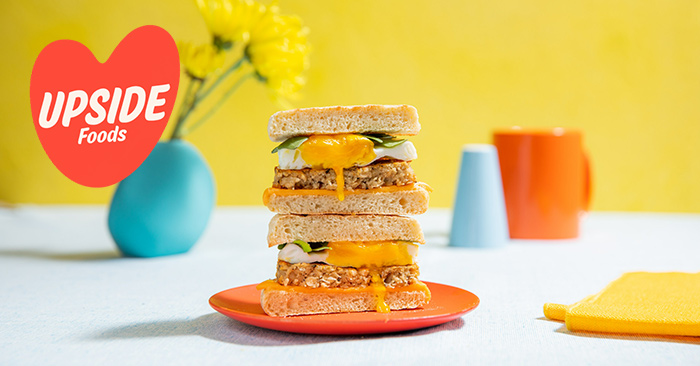
UPSIDE Foods Launches New Range of Ground Meat Products
Just months after its cultivated chicken filet received the greenlight from the U.S. Food and Drug Administration (FDA), UPSIDE Foods has announced its next products will be made from ground chicken. products.
The new ground meat line will be made with cultivated meat in addition to ingredients such as herbs, vegetables, spices and other plant-based proteins. According to UPSIDE the regulatory process for its ground products, which are based on cells grown in a suspension culture, will be separate from that of its first product, which utilizes an adherent tissue-based process.
Along with the product news, the company also revealed it has developed a chicken cell line that does not utilize platelet-derived growth factors (PDGF), an expensive ingredient used to support cell growth that would drive up end costs of its cultured meat.
“We’ve always known that we need to provide a portfolio that matches the diversity of formats and forms that consumers expect,” said UPSIDE founder and CEO Dr. Uma Valeti in a press release. “Our first consumer product, a cultivated chicken filet, demonstrates our ability to deliver the experience of eating a more complex and textured meat product. On the other hand, our ground products are extremely versatile and enable us to explore a range of exciting formats and flavor experiences, while also allowing us to scale faster and make cultivated meat more accessible.”
In November, the California-based company received a “No Questions” letter from the FDA, the equivalent to earning Generally Recognized as Safe (GRAS) status, indicating the administration accepts UPSIDE’s case for consumption of its cultivated chicken product. Now, the product is undergoing review by the U.S. Department of Agriculture (USDA) for remaining approvals before the company can begin selling it to consumers.
In the release, UPSIDE said it will continue working with the FDA and USDA to bring its next generation of products to market.


